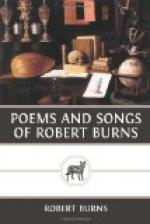Young, royal Tarry-breeks,
I learn,
Ye’ve lately come
athwart her—
A glorious galley,^4
stem and stern,
Weel rigg’d for
Venus’ barter;
But first hang out,
that she’ll discern,
Your hymeneal charter;
Then heave aboard your
grapple airn,
An’ large upon
her quarter,
Come full that day.
Ye, lastly, bonie blossoms
a’,
Ye royal lasses dainty,
Heav’n mak you
guid as well as braw,
An’ gie you lads
a-plenty!
But sneer na British
boys awa!
For kings are unco scant
aye,
An’ German gentles
are but sma’,
They’re better
just than want aye
On ony day.
[Footnote 2: King Henry V.—R.B.]
[Footnote 3: Sir John Falstaff, vid. Shakespeare.—R. B.]
[Footnote 4: Alluding
to the newspaper account of a certain
Royal sailor’s
amour.—R. B. This was Prince William
Henry,
third son of George
III, afterward King William iv.]
Gad bless you a’!
consider now,
Ye’re unco muckle
dautit;
But ere the course o’
life be through,
It may be bitter sautit:
An’ I hae seen
their coggie fou,
That yet hae tarrow’t
at it.
But or the day was done,
I trow,
The laggen they hae
clautit
Fu’ clean that
day.
A Dedication
To Gavin Hamilton, Esq.
Expect na, sir, in this
narration,
A fleechin, fleth’rin
Dedication,
To roose you up, an’
ca’ you guid,
An’ sprung o’
great an’ noble bluid,
Because ye’re
surnam’d like His Grace—
Perhaps related to the
race:
Then, when I’m
tir’d—and sae are ye,
Wi’ mony a fulsome,
sinfu’ lie,
Set up a face how I
stop short,
For fear your modesty
be hurt.
This may do—maun
do, sir, wi’ them wha
Maun please the great
folk for a wamefou;
For me! sae laigh I
need na bow,
For, Lord be thankit,
I can plough;
And when I downa yoke
a naig,
Then, Lord be thankit,
I can beg;
Sae I shall say—an’
that’s nae flatt’rin—
It’s just sic
Poet an’ sic Patron.
The Poet, some guid
angel help him,
Or else, I fear, some
ill ane skelp him!
He may do weel for a’
he’s done yet,
But only—he’s
no just begun yet.
The Patron (sir, ye
maun forgie me;
I winna lie, come what
will o’ me),
On ev’ry hand
it will allow’d be,
He’s just—nae
better than he should be.
I readily and freely
grant,
He downa see a poor
man want;
What’s no his
ain, he winna tak it;
What ance he says, he
winna break it;
Ought he can lend he’ll
no refus’t,
Till aft his guidness
is abus’d;
And rascals whiles that
do him wrang,
Ev’n that, he
does na mind it lang;
As master, landlord,
husband, father,
He does na fail his
part in either.




